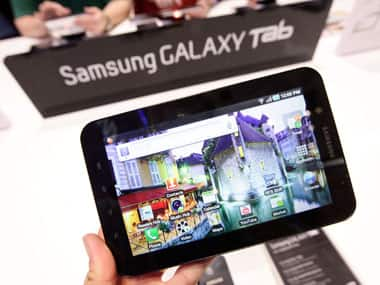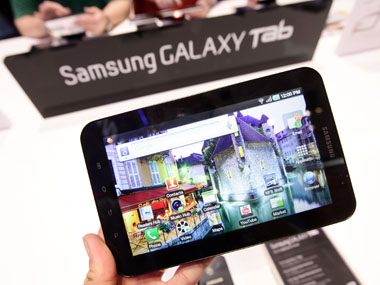‘Samsung beats Apple in tablet war’ may sound like a delusional headline for now, when the iPad has trounced all rivals worldwide by a mile and more.
Even with the resignation of Steve Jobs from Apple two weeks ago, it will take a while for the iPad’s challengers to snatch the crown from Apple.
When last computed, Apple had nearly two-thirds of the global tablet market, even though Android-based tablets by rivals such as Samsung, LG, HTC, Acer, Motorola, HP and Dell have been gaining market share - in the range of 20-30 percent collectively.
[caption id=“attachment_74682” align=“alignleft” width=“380” caption=“Of course, Samsung’s overwhelming market leadership based on 85,000 tablets sold is not going to last even in India. Sean Gallup/Getty Images”]
 [/caption]
[/caption]
In April-June 2011, 15.1 million tablets were shipped worldwide, of which iPads accounted for 9.3 million.
So where has Apple been beaten?
The answer: India.
Data from CyberMedia Research shows that Samsung’s Galaxy Tab has run away with 85 percent of the Indian market, using an aggressive distribution and pricing strategy, says newspaper DNA (Daily News & Analysis).
Excuse me? And where’s Apple’s iPad in all this? The survey, which pertains to market share between November 2010 and March 2011, gives Apple a pathetic 6 percent.
Impact Shorts
More ShortsOf course, Samsung’s overwhelming market leadership based on 85,000 tablets sold is not going to last even in India. Apple lost its 94 percent global share of April-June 2010 quickly and reached 61 percent a year later. So Samsung will surely not hold on to its India lead for sure as the market expands and competition intensifies.
It’s already happening. With a slew of low-cost Android tablets coming from Reliance (Rs 12,999), Beetel’s Magiq (Rs 8,999), Mercury’s mTab ( Rs 9,499) and MSI Energy’s 7 and 10 (Rs 14,999 and Rs 13,999, depending on size), there is no way Samsung is going to retain what it has for long.
Apple’s problem is that it does not have a well-thought-out India strategy. It lost out by starting late, and even now it does not have a separate India strategy. Nokia and BlackBerry are doing well in India - even as they decline elsewhere -because they have formulated an effective country plan.
What is clear is that even if Samsung loses its current grip on the market, Apple will not be the gainer. The only real gainer will be the Android operating system of Google - which is the market leader in India and will remain so.
Few multinationals have succeeded in India without rethinking their gameplans. Long after it bought Thums Up, Coke failed to emerge market leader. Honda bikes won because it was a Hero strategy to start with - 80 km per litre mileage. Toyota has realised that it can’t beat Maruti by staying at the bigger end alone.
Tim Cook, Steve Jobs’ successor, can learn a few lessons from their experiences.
)